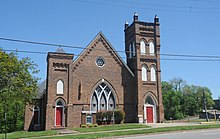African Americans in North Carolina
| Total population | |
|---|---|
| 2,415,824[1] (2017) | |
| Regions with significant populations | |
| Charlotte, Durham, Fayetteville, Greensboro, Raleigh | |
| Languages | |
| Southern American English, African-American Vernacular English, Gullah, African languages | |
| Religion | |
| Black Protestant[2] | |
| Related ethnic groups | |
| African Americans, Barbadian Americans, West Indian Americans, Barbadians |




| Part of a series on |
| African Americans |
|---|
| History of North Carolina |
|---|
 |
African-American North Carolinians or Black North Carolinians are residents of the state of North Carolina who are of African ancestry. As of the 2010 U.S. Census, African Americans were 22% of the state's population.[3] African enslaved people were brought to North Carolina during the slave trade.[4]
History
[edit]Slavery has been part of North Carolina's history since its colonization by white Europeans in the late 1600s and early 1700s. Many of the first black enslaved people in North Carolina were brought to the colony from the West Indies, but a significant number were brought from Africa. Records were BURNED of the tribes and homelands of African enslaved people in North Carolina.[5]
African Americans in North Carolina suffered from racial segregation. Most white people in North Carolina sought to refine the Jim Crow system and retain systematic segregation.[6]
List of historic communities
[edit]- Rock Hill, Asheville, North Carolina[7]
- Petersburg, Asheville, North Carolina
- Brooklyn, Asheville, North Carolina
- Old Shiloh, Asheville, North Carolina[8][9]
- [New] Shiloh, Asheville, North Carolina[10]
- Lincoln Park, Burnsville, North Carolina[11]
People
[edit]
- John Chavis
- Abraham Galloway
- George Moses Horton, an enslaved poet, North Carolina's first known author of literature
- Elizabeth Keckley
- George White
See also
[edit]- African Americans in South Carolina
- African Americans in Tennessee
- African Americans in Georgia (U.S. state)
- Atlantic Creole
- Bristol slave trade
- Coastwise slave trade
- Colonial South and the Chesapeake
- Great Dismal Swamp maroons
- Gullah
- History of slavery in North Carolina
- Scramble (slave auction)
- Seasoning (colonialism)
- Slavery in the colonial history of the United States
- Tobacco colonies
- Demographics of North Carolina
- List of African-American historic places in North Carolina
- List of African-American newspapers in North Carolina
- Black Southerners
- History of North Carolina
References
[edit]- ^ "North Carolina". blackdemographics.com.
- ^ "Religious Landscape Study".
- ^ "North Carolina QuickFacts from the US Census Bureau". Quickfacts.census.gov. 2011. Archived from the original on January 19, 2014. Retrieved January 21, 2014.
- ^ "NCpedia | NCpedia".
- ^ "NCpedia | NCpedia".
- ^ "African Americans - Part 4: Segregation | NCpedia".
- ^ "History". Shiloh Community Association. Retrieved 2018-08-05.
- ^ "History". Shiloh Community Association. Retrieved 2018-08-05.
- ^ "More Than Biltmore | endeavors". endeavors.unc.edu. Retrieved 2018-08-05.
- ^ "History of Cemetery". South Asheville Cemetery Association. Retrieved 2018-08-05.
- ^ "History". Traditional Voices Group. Retrieved 2023-11-18.
- ^ Black History Month – North Carolinians to Remember
External links
[edit]- A brief history of slavery in North Carolina
- Slavery
- African Presence in North Carolina
- African American History Across North Carolina
- A History of African Americans in North Carolina
- 1898 and White Supremacy
- "History of African Americans in North Carolina". University of North Carolina Press. 17 August 2022. Retrieved 9 December 2023.
- Sharpe, Cynthia (7 February 2022). "Beyond The Beach: African-American History in Coastal Carolina". Coastwatch. Retrieved 9 December 2023.
- "Civil Rights Movement". North Carolina History Project. 16 March 2016. Retrieved 9 December 2023.
- "Native American Tribes, Colonel History & the Wright Brothers". history.com. 9 November 2009. Retrieved 9 December 2023.
